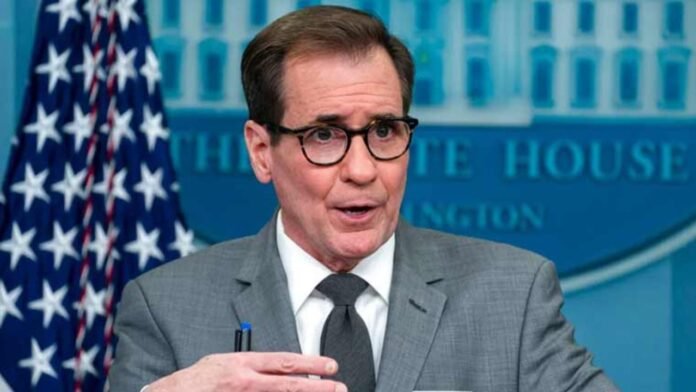The recent developments in the Middle East, particularly the assassination of Hezbollah leader Hassan Nasrallah, have heightened tensions between the U.S., Israel, and Iran. The incident has not only sparked reactions from key regional players but has also put U.S. policy under the microscope. In this context, statements from U.S. officials, including John Kirby and Defense Secretary Lloyd Austin, highlight Washington’s cautious but firm stance in addressing the evolving situation.
U.S. Responds to Hezbollah Leadership Crisis
White House National Security Council spokesperson John Kirby has conveyed Washington’s watchful stance regarding the situation in the Middle East, especially after Hezbollah’s leadership crisis. During an interview with a U.S. broadcaster, Kirby said that Washington is carefully monitoring the statements coming from Tehran and is waiting to observe what actions Iran might take following the assassination of Hezbollah’s Secretary-General, Hassan Nasrallah.
The assassination of Nasrallah, who played a central role in Hezbollah’s operations, has left a leadership vacuum within the militant group. This leadership gap could affect the group’s strategic direction, particularly regarding its ties with Iran and its involvement in regional conflicts, such as the ongoing hostilities in Gaza.
Kirby further indicated that the U.S. continues to engage with Israel regarding the best course of action in Lebanon. Hezbollah’s stronghold in Lebanon and its connection to Iran makes it a crucial player in the geopolitical chessboard of the region. The U.S., while supporting Israel, is closely watching to see how Hezbollah fills this leadership void and what implications this could have on the wider region.
U.S.-Iran Rejects the Notion of Full-Scale War with Iran or Hezbollah
Amid growing concerns about potential escalation, Kirby reiterated the U.S. position on avoiding a full-scale war with Hezbollah or Iran. He emphasized that such a conflict would not be a solution for safely returning displaced populations in northern Israel to their homes. This statement suggests that while the U.S. remains committed to Israel’s security, it is cautious about entangling itself in a broader military conflict that could destabilize the region further.
Kirby also stressed that the U.S. support for Israel’s security remains firm and unchanging. This assurance is a clear message to both allies and adversaries that, despite the tensions, Washington’s commitment to safeguarding Israel’s sovereignty and security will not waver.
U.S.-Iran Defense Strategy: Containing Iran’s Influence
In a separate statement, U.S. Defense Secretary Lloyd Austin echoed Kirby’s sentiments but focused more on America’s broader strategy in the region. Austin made it clear that the U.S. is determined to curb Iran’s growing influence in the Middle East. Iran has long supported groups like Hezbollah and Hamas, providing them with resources and political backing, thereby amplifying its role in regional conflicts.
Austin underscored that the U.S. is taking active steps to protect its interests in the Middle East. This includes strengthening alliances with regional partners and maintaining a strong military presence to counter threats posed by Iran and its proxies. The U.S. strategy aims to both deter Iranian aggression and ensure that the power dynamics in the region do not shift in favor of Tehran.
Israel’s Strike and the Aftermath U.S.-Iran
The assassination of Hassan Nasrallah has sparked immediate reactions across the region, with Hezbollah, Iran, and their allies condemning the Israeli airstrike that killed the Hezbollah leader. Nasrallah, who was viewed as a symbol of resistance by Hezbollah’s supporters, played a pivotal role in the organization’s military and political activities, particularly in its opposition to Israel.
Iran’s Foreign Minister Abbas Araghchi quickly accused the U.S. of complicity in Nasrallah’s death, stating that his killing would not go unanswered. Araghchi’s remarks signal Iran’s intent to retaliate, further inflaming the situation in the region. He emphasized that Israel’s actions in Lebanon would prevent it from finding peace, and that Iran would use all available political, diplomatic, and legal avenues to hold those responsible accountable.
The Regional Implications of Nasrallah’s Death
Nasrallah’s assassination could have far-reaching consequences for the stability of the region. Hezbollah, which has been a significant force in Lebanon’s political and military landscape, will likely undergo a period of transition as it seeks to fill the leadership void left by Nasrallah’s death. How this transition unfolds could determine the future of Hezbollah’s activities in Lebanon and its role in regional conflicts, especially its involvement in the Gaza Strip alongside Hamas.
At the same time, Iran’s backing of Hezbollah remains strong, and Tehran will likely continue to support the group as it navigates this leadership crisis. Iran’s regional ambitions, coupled with its alliance with Hezbollah, suggest that the fallout from Nasrallah’s death will reverberate throughout the Middle East, potentially escalating tensions between Israel, Hezbollah, and Iran.
Conclusion
The assassination of Hezbollah leader Hassan Nasrallah marks a significant moment in the ongoing conflict between Israel and Iran-backed militant groups. As the U.S. closely monitors the situation, its officials have made it clear that while Washington remains committed to Israel’s security, it seeks to avoid a broader military conflict. Meanwhile, Iran’s vow to retaliate indicates that the situation is far from resolved, and the region may see further instability in the weeks and months to come.


